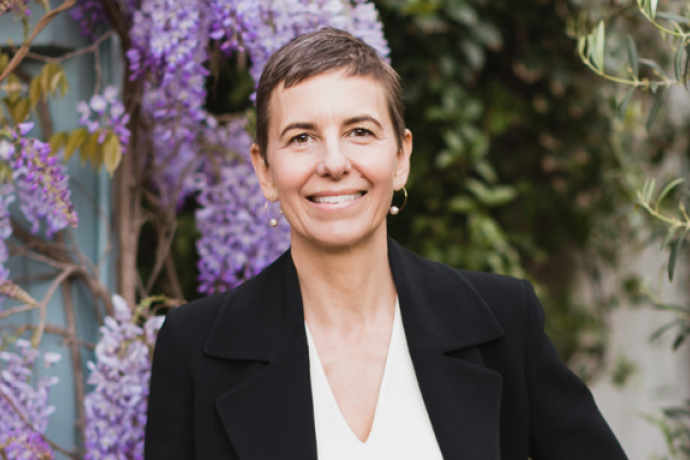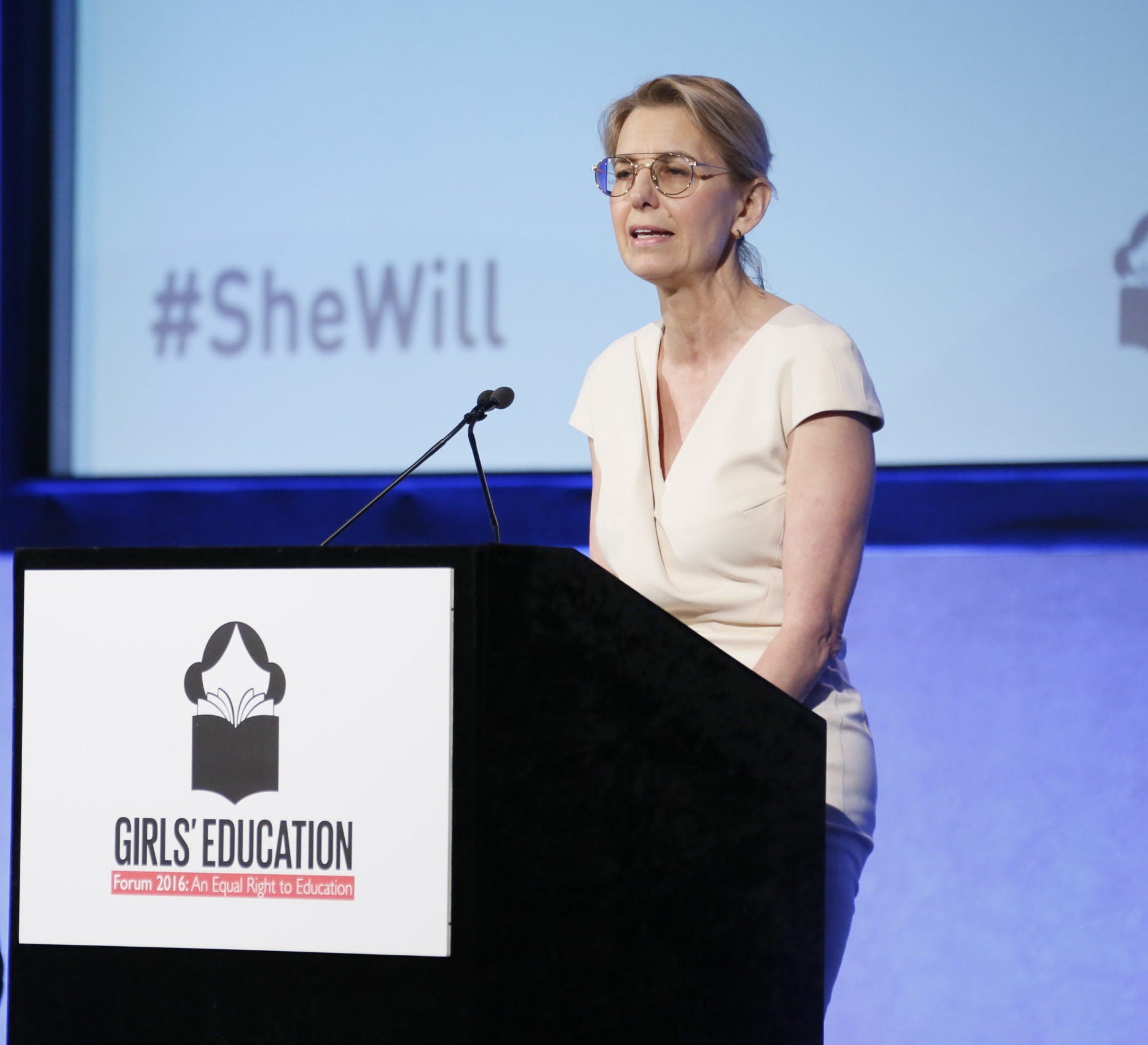Title: MSFS Legacy for the Future: Maria Eitel (MSFS ’88)
This story is part of our MSFS Legacy for the Future series profiling members of the MSFS community who have made, or are poised to make, important contributions to international affairs. Through our Legacy for the Future campaign, you can support MSFS scholarships for talented students and ensure that the leaders and innovators of the future are given the skills and opportunities they need to meet the global challenges of tomorrow, today. Make your contribution to MSFS Legacy for the Future now.

When Maria Eitel (MSFS ‘88) became Nike’s first Vice President for Corporate Responsibility in 1998, it was the start of something big. Tasked with steering the company toward growth that was not only profitable but also inclusive and sustainable, Eitel co-founded the Nike Foundation. The aim of the Foundation was to harness the power of sport, and Nike’s global influence, to make positive impacts on communities all over the world.
“When I joined Nike twenty-two years ago, there was no language of ‘corporate responsibility’ or ‘corporate social responsibility’,” Eitel says. “It wasn’t a field of study, and it wasn’t a department that companies had.” Working alongside Nike’s board, she began to envision what an effective corporate responsibility strategy could look like for a company that had employees, customers, and partners all over the world. “We set up the labor practices and the environmental sustainability department,” she remembers. “And adopted the environmental sustainability policy. We committed to all kinds of things and over the years we have really walked that talk.”
As a former media specialist in both the public and private sectors (she had been Special Assistant for Media Affairs to Pres. George H.W. Bush and a Senior Manager at MCI Corporation before joining Nike), Eitel knew how strongly communicated values could determine an organization’s culture. One of the first initiatives her new Corporate Responsibility team worked on was to rewrite the company’s mission to be more inclusive. “If you have a body, you’re an athlete. We rewrote the mission to bring inspiration and innovation to every athlete in the world,” she says. “We really changed the company and found who we were. We really believe in human potential.”
Early on, Eitel began to look for an area of focus for the Foundation that would enable Nike to have the greatest global impact and to fulfill its commitment to supporting all individuals to achieve their potential. The organization set its sights on a seemingly simple but transformative goal: to invest in adolescent girls around the world and promote them as the agents of change who could eradicate poverty within their communities.
The decision to focus on girls came out of many conversations Eitel had with colleagues, professional acquaintances, and experts. “I talked to everybody! I asked, ‘What would you focus on if you ran the Nike Foundation?’ And what kept coming back to me was the untapped potential of women as global economic actors.”
Eitel spent time traveling to and talking with communities all over the world to better understand how the Foundation could support women to transform economic conditions for their communities. She encountered many women whose career and educational trajectories had been interrupted by early pregnancy, childhood marriage, and health issues, including HIV. “I kept thinking, could we solve the root cause of the problem instead of trying to solve it after it happens?” she remembers. “Could we catch girls and get them what they need when they’re adolescents?”
At the time, adolescent girls rarely featured in policy discussions. “It was crazy at the beginning,” Eitel says. “We had a party every time the word ‘girls’ was mentioned in an article or a policy-maker, or the World Bank, or a government talked about girls.” Eitel hired some of Nike’s most talented people to her team and drew on the company’s business culture to get girls on the agenda of global decision-makers. “We ran like a business unit with a business plan: budgeting, timeline, and deliverables. We had to achieve it as a company just like we had to achieve the launch of the next Jordan shoe.”

Under Eitel’s leadership, the Nike Foundation launched a new campaign at the 2009 World Economic Forum’s Annual Meeting in Davos. In a video that has amassed more than 1 million Youtube views, the Girl Effect campaign encouraged global leaders to recognize girls as the key to ending poverty. Provide education and opportunities to girls, it argued, and you will see a reduction in poverty, improved health and sanitation, and higher education rates across whole communities.
Eitel’s team knew that if they were going to make headway, they had reach the most powerful people in the world. She admits that when they first floated the idea of launching at Davos, it seemed unlikely to come to fruition: “It was completely ridiculous because the World Economic Forum had not only never had anything on girls it had never had a plenary on women!”
Despite the lack of precedent, Girl Effect succeeded in introducing the first-ever plenary session focused on adolescent girls at the World Economic Forum. The panel—which included Melinda Gates, Ngozi Okonjo-Iweala, Managing Director of The World Bank, and Nike’s CEO, Mark Parker—discussed the potential trillions of dollars girls could add to national economies and the costs of “an irrational investment gap” which did not direct resources to girls.
After the Davos launch, the “girl effect” became a key issue and recognized term within development policy. Girl Effect worked with The World Bank to develop a report that quantified the economic potential of investing in girls. Published in 2011, it found numerous areas where a lack of investment in adolescent girls could have a drastic impact on a country’s wealth. For instance, it found that if Ethiopian girls completed secondary school it would add half a billion dollars to the country’s GDP per year. It also found that when 204,000 adolescent girls gave birth in Kenya in a year, it cost the country $10 billion in foregone national income over those girls’ lifetimes. Data backed up the Girl Effect idea.

Photo Credit: Russell Watkins/Department for International Development
In 2014, alongside UNICEF, and with the support of UK Prime Minister David Cameron, Girl Effect hosted a summit aiming to end FGM and child marriage. After the event, 19 countries committed to ending the practices within a generation. A year later, thanks to Girl Effect’s “Girl Declaration” calling for girls to be explicitly included in the global development framework, achieving gender equality and empowerment for all women and girls was included as the fifth Sustainable Development Goal.
Eleven years on from that first video at Davos, Girl Effect is an independent movement that uses media and mobile technology to empower girls to change their lives. By developing country-specific youth brands that focus on girls, Girl Effect empowers them to tell their own stories and highlight the issues that affect them. The organization also develops mobile platforms that digitally connect marginalized and vulnerable girls and provides them with important information on health, education, financial security, and personal safety. In the past year, Girl Effect’s mobile platforms reached 12.7 million unique visitors.
For more than two decades, Eitel has used her expertise and skills to push the field of corporate social responsibility forward and to shift development thinking into new and exciting spaces. Her career is an example of the MSFS program’s core value of creative leadership in action. At Girl Effect, Eitel has drawn upon the skills and experiences she first developed at MSFS to drive the movement’s vast and global reach.
A member of the MSFS Advisory Board, Eitel believes that—as global development and business faces increasingly rapid and dramatic change—enabling more students to train within the mission and values of the program is more important than it has ever been. As Eitel knows well from her work at Girl Effect, providing more underrepresented individuals with opportunities for personal and professional development can engender widespread global change.
Maria Eitel is an MSFS Advisory Board Member. Support MSFS in continuing to produce future international leaders. Donate to our MSFS Legacy for the Future campaign today.